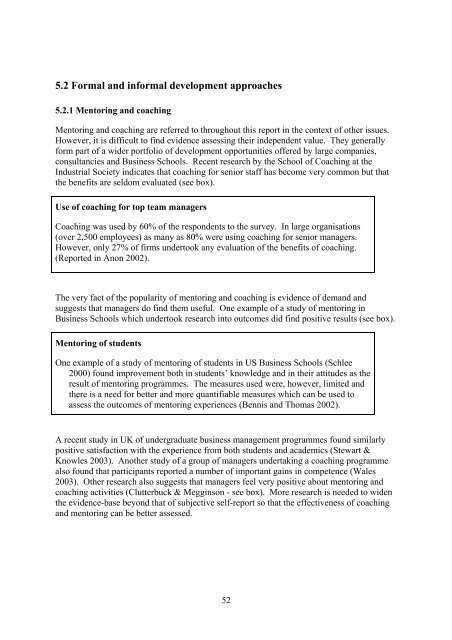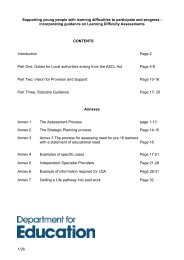The Development of Management and Leadership Capability and its ...
The Development of Management and Leadership Capability and its ...
The Development of Management and Leadership Capability and its ...
You also want an ePaper? Increase the reach of your titles
YUMPU automatically turns print PDFs into web optimized ePapers that Google loves.
5.2 Formal <strong>and</strong> informal development approaches<br />
5.2.1 Mentoring <strong>and</strong> coaching<br />
Mentoring <strong>and</strong> coaching are referred to throughout this report in the context <strong>of</strong> other issues.<br />
However, it is difficult to find evidence assessing their independent value. <strong>The</strong>y generally<br />
form part <strong>of</strong> a wider portfolio <strong>of</strong> development opportunities <strong>of</strong>fered by large companies,<br />
consultancies <strong>and</strong> Business Schools. Recent research by the School <strong>of</strong> Coaching at the<br />
Industrial Society indicates that coaching for senior staff has become very common but that<br />
the benef<strong>its</strong> are seldom evaluated (see box).<br />
Use <strong>of</strong> coaching for top team managers<br />
Coaching was used by 60% <strong>of</strong> the respondents to the survey. In large organisations<br />
(over 2,500 employees) as many as 80% were using coaching for senior managers.<br />
However, only 27% <strong>of</strong> firms undertook any evaluation <strong>of</strong> the benef<strong>its</strong> <strong>of</strong> coaching.<br />
(Reported in Anon 2002).<br />
<strong>The</strong> very fact <strong>of</strong> the popularity <strong>of</strong> mentoring <strong>and</strong> coaching is evidence <strong>of</strong> dem<strong>and</strong> <strong>and</strong><br />
suggests that managers do find them useful. One example <strong>of</strong> a study <strong>of</strong> mentoring in<br />
Business Schools which undertook research into outcomes did find positive results (see box).<br />
Mentoring <strong>of</strong> students<br />
One example <strong>of</strong> a study <strong>of</strong> mentoring <strong>of</strong> students in US Business Schools (Schlee<br />
2000) found improvement both in students’ knowledge <strong>and</strong> in their attitudes as the<br />
result <strong>of</strong> mentoring programmes. <strong>The</strong> measures used were, however, limited <strong>and</strong><br />
there is a need for better <strong>and</strong> more quantifiable measures which can be used to<br />
assess the outcomes <strong>of</strong> mentoring experiences (Bennis <strong>and</strong> Thomas 2002).<br />
A recent study in UK <strong>of</strong> undergraduate business management programmes found similarly<br />
positive satisfaction with the experience from both students <strong>and</strong> academics (Stewart &<br />
Knowles 2003). Another study <strong>of</strong> a group <strong>of</strong> managers undertaking a coaching programme<br />
also found that participants reported a number <strong>of</strong> important gains in competence (Wales<br />
2003). Other research also suggests that managers feel very positive about mentoring <strong>and</strong><br />
coaching activities (Clutterbuck & Megginson - see box). More research is needed to widen<br />
the evidence-base beyond that <strong>of</strong> subjective self-report so that the effectiveness <strong>of</strong> coaching<br />
<strong>and</strong> mentoring can be better assessed.<br />
52
















